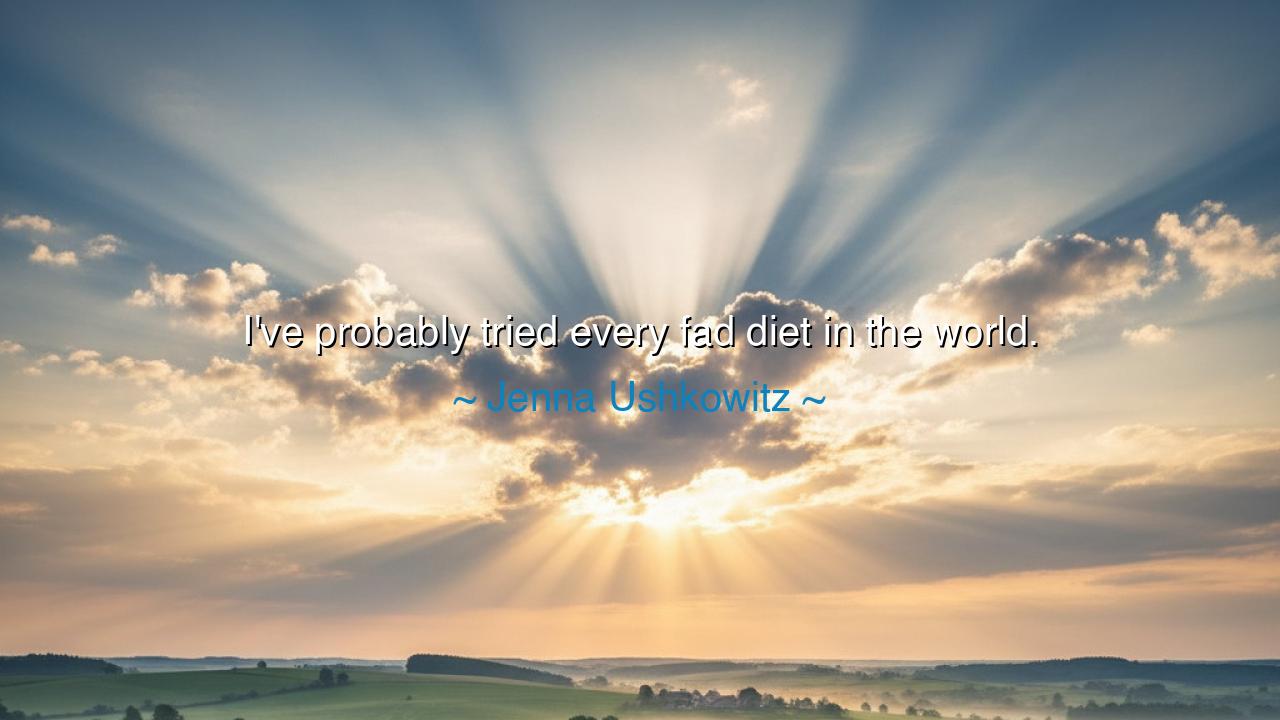
I've probably tried every fad diet in the world.






In the candid words of Jenna Ushkowitz, there is both confession and revelation: “I’ve probably tried every fad diet in the world.” Beneath this simple admission lies the weary echo of a universal struggle—the restless quest for perfection, the human longing to change what one sees in the mirror, and the endless cycle of hope and disappointment that follows false promises. Her words are not merely about food; they are about the illusion of transformation without understanding, the hunger for quick fixes in a world that prizes appearance over essence. In this, Ushkowitz becomes a mirror for all who have sought salvation in fleeting trends rather than in enduring truth.
The fad diet—that ever-shifting mirage of modern times—has replaced the sacred wisdom of nourishment with the restless churn of novelty. It promises miracles: beauty without patience, health without discipline, and joy without self-acceptance. But as Ushkowitz confesses, to follow one after another is to wander through a desert of illusion. Each new diet begins with hope and ends with emptiness, for no meal plan can fill the deeper hunger of the soul—the longing for peace within oneself. Her words speak to this ancient human folly: the belief that external transformation can heal internal unrest.
The ancients, too, knew the dangers of excess and false pursuit. The philosopher Epicurus, often misunderstood as a lover of indulgence, taught that true pleasure was found not in extremes but in balance. He warned that to chase satisfaction without understanding its source is to chase shadows. Those who feast without wisdom grow sick, and those who starve themselves without purpose grow weak—not only in body, but in spirit. So it is with fad diets: they feed neither strength nor serenity, only the vanity of change without the substance of growth. Ushkowitz’s honesty reminds us that wisdom begins when we tire of these empty cycles and turn inward to seek harmony instead of control.
Consider the story of Emperor Nero’s court, where beauty and indulgence were worshiped as divine. His courtiers, desperate to please, experimented with every manner of regimen to preserve youth and favor—eating gold leaf, fasting for days, drinking concoctions of honey and vinegar. Yet their health failed, their spirits weakened, and their minds grew hollow with obsession. The empire’s physicians, men of knowledge but not of wisdom, could not save them, for they treated symptoms, not causes. Like them, the modern soul chases fad after fad, never pausing to ask what truly nourishes the self. Ushkowitz’s reflection, though personal, is a warning across centuries: that what is fashionable may not be what is good, and what is simple may be what saves us.
There is also humility in her words—the kind that only comes from experience. To admit, “I have tried them all,” is to confess not only failure, but awakening. For one who has walked through illusion and found it hollow stands closer to truth than one who has never questioned. Ushkowitz’s journey through countless diets is not shameful; it is the modern version of an ancient pilgrimage—the long road from ignorance to understanding. Like a traveler who has circled the earth only to find that home was within her all along, she reminds us that the answer to our struggles lies not in the next trend, but in self-acceptance, patience, and care.
Her quote carries another subtle lesson: that the human body is not a problem to be solved, but a temple to be honored. The ancients treated food as ritual, as offering, as communion with the divine. In contrast, the modern world treats food as either an enemy or a cure. We count, measure, and restrict, forgetting that eating, at its core, is an act of life and gratitude. Ushkowitz’s reflection invites us to remember this balance—to reject the noise of a world that profits from our insecurity, and to return to the ancient wisdom of moderation and mindfulness.
Let this then be the teaching drawn from her experience: Seek not the diet of the moment, but the discipline of a lifetime. Feed your body with what strengthens it, your mind with what enlightens it, and your soul with what brings peace. Do not follow every promise that shouts from the marketplace of vanity. Instead, listen to the quiet wisdom of your own nature—it already knows what you need. Choose nourishment over punishment, patience over panic, simplicity over spectacle. For the body, when treated with respect, will heal itself, and the spirit, when freed from comparison, will finally rest.
And so, in the words of Jenna Ushkowitz, we find the timeless truth of human striving: that the path to wellness is not found in every fad diet, but in the courage to stop searching for shortcuts and begin listening to oneself. The ancients called this sophrosyne—the virtue of self-knowledge and moderation. May her reflection remind us all that the greatest transformation is not of the body, but of the heart that learns, at last, to live in harmony with itself.






AAdministratorAdministrator
Welcome, honored guests. Please leave a comment, we will respond soon